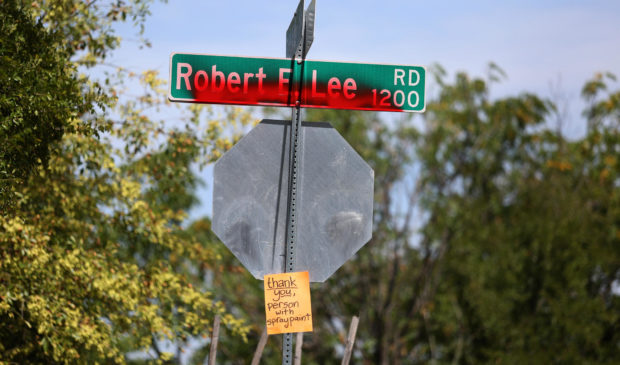Austin will start renaming parks, streets, creeks and anything else that honors white supremacy
Thursday, July 30, 2020 by
Andrew Weber, KUT Austin will reexamine – and could ultimately change – the names of its streets, buildings, parks and creeks that venerate historical racism and the Confederacy.
The decision Wednesday from the Austin City Council follows up on a 2018 report from the city’s Equity Office, which suggested changing the name of the city itself, as Stephen F. Austin was a staunch defender of slavery.
The resolution directs the city manager to choose between five and 10 “city assets” to present to Council as candidates for renaming within a six-month period starting in September. If a street or park is “latent with Confederate and white supremacist history,” it will move forward in a rebranding process, which will include public input.
District 1 Council Member Natasha Harper-Madison, who authored the resolution, said shortly before Council approval that the measure will address the “living monuments” in public spaces that honor systemic racism, race-based slavery and white supremacy.
“It would be the height of hypocrisy to say ‘Black lives matter’ and not address the elephant in our streets: Confederate Avenue, Plantation Road and Dixie Drive,” she said. “These existing street names have no place in the city of Austin.”
In 2018, Austin changed the name of two major roads named explicitly for Confederate figures, renaming them to honor historical Black figures Azie Morton and William Holland.
The framework for the renaming will be based on the Equity Office report. Released in July 2018, the report identified seven streets as “high priority” for potential renaming:
- Littlefield Street
- Tom Green Street
- Sneed Cove
- Reagan Hill Drive
- Dixie Drive
- Plantation Road
- Confederate Avenue
The Equity Office’s report also suggested adding context to a handful of historical landmarks and signs, or removing them altogether. Those second-tier suggestions honor figures who weren’t directly tied to the Confederacy, but were complicit or connected to historical racism, segregation or slavery.
The office also suggested the city reconsider the names of Austin’s most recognizable streets, like Lamar Boulevard, as well as parks and landmarks – including Pease Park, Barton Springs, and Bouldin and Waller creeks – but not before input from Council and the public.
It also suggested renaming the city, because Austin fought against Mexico’s ban on slavery during the Texas Revolution and he espoused racist views.
Harper-Madison told KUT’s Audrey McGlinchy that it wasn’t immediately clear if the city’s name could be on the table for a potential renaming.
The approval comes as Council also decided to rename Metz Recreation Center, which honors a Confederate cavalryman, to honor Rudolfo “Rudy” Mendez, a native East Austinite who founded the Ballet East Dance Company.
The resolution was one of four items put forth by Harper-Madison to address racism in Austin. Collectively, she said, the resolutions are not intended to be a “silver bullet,” but they represent steps forward in confronting Austin’s racist past in light of the reckoning with racism that’s followed the police killings of George Floyd, Breonna Taylor and Mike Ramos.
Photo: The vandalizing of the Robert E. Lee Road sign in early 2018 helped spark a conversation over whether the street honoring the Confederate general should be renamed. Austin City Council voted to change the name of the street later that year.
This story was produced as part of the Austin Monitor’s reporting partnership with KUT.
The Austin Monitor’s work is made possible by donations from the community. Though our reporting covers donors from time to time, we are careful to keep business and editorial efforts separate while maintaining transparency. A complete list of donors is available here, and our code of ethics is explained here.
You're a community leader
And we’re honored you look to us for serious, in-depth news. You know a strong community needs local and dedicated watchdog reporting. We’re here for you and that won’t change. Now will you take the powerful next step and support our nonprofit news organization?









